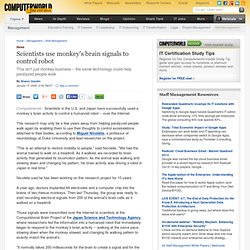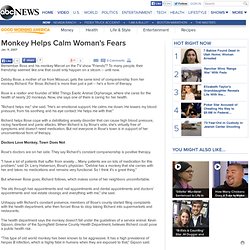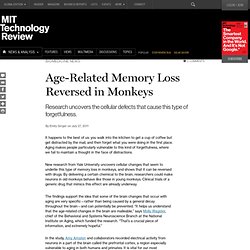

Mind Control Monkey Moves Robot in Japan. New Software Developed to Recognize Monkey Faces. Photo: TheBusyBrain / cc Computers are already better than humans at games like Chess and Jeopardy, but soon they may best us at recognizing monkeys, too.

For researchers studying great ape populations in the wild, learning to distinguish between faces is key to ensuring that no individual is counted twice -- and that often takes a keen eye and months of working closely with the animals. Now, thanks to a new facial-recognition software being developed, soon computers may be able to identify primate mugs much in the same way current technology can spot human faces, allowing primatologists to more accurately gauge the health of the world's most imperiled primates.According to a report from The Engineer, researchers from Germany are developing a method of distinguishing between individual chimpanzees from photos and videos of the animals taken in the wild as a way of allowing a more accurate census in a particular area. Scientists use monkey's brain signals to control robot. News January 15, 2008 12:00 PM ET Computerworld - Scientists in the U.S. and Japan have successfully used a monkey's brain activity to control a humanoid robot -- over the Internet.

This research may only be a few years away from helping paralyzed people walk again by enabling them to use their thoughts to control exoskeletons attached to their bodies, according to Miguel Nicolelis, a professor of neurobiology at Duke University and lead researcher on the project. "This is an attempt to restore mobility to people," said Nicolelis. "We had the animal trained to walk on a treadmill. Nicolelis said he has been working on this research project for 10 years. "It normally takes 250 milliseconds for the brain to create a signal and for the leg to move," said Nicolelis. Monkey Helps Calm Woman's Fears. <br/><a href=" US News</a> | <a href=" Business News</a> Copy Remember Ross and his monkey Marcel on the TV show "Friends"?

To many people, their friendship seemed like one that could only happen on a sitcom -- until now. Debby Rose, a mother of six from Missouri, gets the same kind of companionship from her monkey Richard. For Rose, Richard is more than just a pet -- he's a form of therapy. Rose is a realtor and founder of Wild Things Exotic Animal Orphanage, where she cares for the health of nearly 20 monkeys. "Richard helps me," she said. Richard helps Rose cope with a debilitating anxiety disorder that can cause high blood pressure, racing heartbeat and panic attacks.
Doctors Love Monkey, Town Does Not Rose's doctors are on her side. "I have a lot of patients that suffer from anxiety ... But wherever Rose goes, Richard follows, which makes some of her neighbors uncomfortable. The health department says the monkey doesn't fall under the guidelines of a service animal. Age-Related Memory Loss Reversed in Monkeys. It happens to the best of us: you walk into the kitchen to get a cup of coffee but get distracted by the mail, and then forget what you were doing in the first place.

Aging makes people particularly vulnerable to this kind of forgetfulness, where we fail to maintain a thought in the face of distractions. New research from Yale University uncovers cellular changes that seem to underlie this type of memory loss in monkeys, and shows that it can be reversed with drugs. By delivering a certain chemical to the brain, researchers could make neurons in old monkeys behave like those in young monkeys. Clinical trials of a generic drug that mimics this effect are already underway. The findings support the idea that some of the brain changes that occur with aging are very specific—rather than being caused by a general decay throughout the brain—and can potentially be prevented.